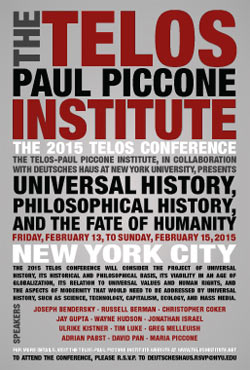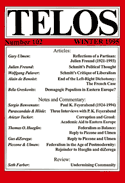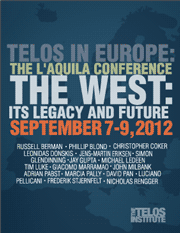By Pierre-André Taguieff · Saturday, June 25, 2016 Today, the anti-elitist political concept responds directly and effectively to social demands in Europe and the United States. And this anti-elitist or anti-system concept perfectly encompasses both the left and right, and, of course, the extremists. As different as they are, the new leaders are protesting and transgressive. Their demagoguery is marked by the language of transgression, provocation, and excess, based on the subversion of language or behavior codes: for them, this is a matter of drawing a clear distinction from the standard model policy. They can complain about being demonized by their opponents, while still trying to stay slightly demonized in order to maintain their attractiveness. This is the prerequisite to the seduction that they perform. This differentiates them from formatted and conformist leaders, who pursue respectability, which makes them somewhat watery.
Continue reading →
By Giuseppina Mecchia · Wednesday, December 23, 2015 Reading the latest novel by Michel Houellebecq, I remembered an essay by Maurice Blanchot that appeared in 1964, entitled “L’Apocalypse déçoit,” roughly translatable as “The Apocalypse Disappoints.” Originally devoted to the intellectual failure on the part of the French intelligentsia to deal with the possibility of nuclear annihilation, the title of that essay seems the perfect commentary to a plot that would sound nothing less than apocalyptic to a very sizable part of contemporary French society: the election of a Muslim president of the French Republic and the Islamization of its civil code. This disastrous occurrence, currently treated in the Western media as nothing less than a catastrophic finis Europae, is narrated by Houellebecq in his increasingly understated voice, now mostly situated halfway between deadpan satire, melancholic brooding, and a touch of occasional melodrama. Gone are the violent Islamic terrorists of Plateforme, the 2001 novel that ended with terrorist attack on European sexual tourists in Thailand. No more spectacular explosions of the 9/11 kind: if the Western way of life will go, it won’t be with a bang, but with a merely audible whimper.
Continue reading →
By Alex Dubilet · Friday, December 18, 2015 A miasma of exhaustion and obsolescence pervades Michel Houellebecq’s Submission. It is occasionally punctured by explicit expressions of a pornographic libidinality, but these, in the end, serve only as desperate manifestations of increasingly temporary respites. The end is nigh, if it didn’t already happen. Houellebecq’s universe remains what it has been repeatedly—a universe of male libidinal desire, its intensifying frustrations and anxieties monumentally projected onto the background of the specters of the civilizational decline of the West. Houellebecq is at the tired end of the secular liberal dream of possessive individualism and sexual freedom, or, as the narrator puts it rather succinctly: “In the end, my cock was all I had” (81).
Continue reading →
By David Pan · Thursday, April 9, 2015  The worldwide reaction to the Charlie Hebdo attacks can be seen as a welcome indication of a global consensus concerning freedom of speech, individual rights, and opposition to Islamic fundamentalism. However, left-wing critics such as Noam Chomsky have criticized the worldwide demonstrations against the attacks as hypocritical because they ignore the more serious massacres that have been conducted by Americans with drone strikes and in military activities in Iraq, Serbia, and Syria. As Chomsky writes, “[a]lso ignored in the ‘war against terrorism’ is the most extreme terrorist campaign of modern times—Barack Obama’s global assassination campaign targeting people suspected of perhaps intending to harm us some day, and any unfortunates who happen to be nearby. Other unfortunates are also not lacking, such as the 50 civilians reportedly killed in a U.S.-led bombing raid in Syria in December, which was barely reported.” Such an equation of “their terror” with “our terror” is based on an image of a universal history in which all of mankind lives within a unified natural community and there is a single standard of measure that could be the basis of criminal behavior. We see this same approach in a more moderate form in Jack Miles’s similar exhortation that the proper response to ISIS and Al Qaeda is that “[y]ou are criminals and we send criminals to jail” rather than declaring a “war on radical Islam.” For both Chomsky and Miles, terrorist attacks count as criminal activity and should be equally condemned from the universal viewpoint of a peace-loving humanity. By diminishing the difference between criminal violence and war, they illustrate the basic tenet of a version of universal history—that all humans are linked together into a common set of natural laws and that such laws transcend historical and political differences. Every war in this perspective would be just as senseless and unjustified as any other form of murder. Teju Cole and Slavoj Žižek make a similar move when they indicate that there is something hypocritical about the support for Charlie Hebdo when other massacres, such as the one by Boko Haram in Baga, Nigeria, go unnoticed and unmourned. The worldwide reaction to the Charlie Hebdo attacks can be seen as a welcome indication of a global consensus concerning freedom of speech, individual rights, and opposition to Islamic fundamentalism. However, left-wing critics such as Noam Chomsky have criticized the worldwide demonstrations against the attacks as hypocritical because they ignore the more serious massacres that have been conducted by Americans with drone strikes and in military activities in Iraq, Serbia, and Syria. As Chomsky writes, “[a]lso ignored in the ‘war against terrorism’ is the most extreme terrorist campaign of modern times—Barack Obama’s global assassination campaign targeting people suspected of perhaps intending to harm us some day, and any unfortunates who happen to be nearby. Other unfortunates are also not lacking, such as the 50 civilians reportedly killed in a U.S.-led bombing raid in Syria in December, which was barely reported.” Such an equation of “their terror” with “our terror” is based on an image of a universal history in which all of mankind lives within a unified natural community and there is a single standard of measure that could be the basis of criminal behavior. We see this same approach in a more moderate form in Jack Miles’s similar exhortation that the proper response to ISIS and Al Qaeda is that “[y]ou are criminals and we send criminals to jail” rather than declaring a “war on radical Islam.” For both Chomsky and Miles, terrorist attacks count as criminal activity and should be equally condemned from the universal viewpoint of a peace-loving humanity. By diminishing the difference between criminal violence and war, they illustrate the basic tenet of a version of universal history—that all humans are linked together into a common set of natural laws and that such laws transcend historical and political differences. Every war in this perspective would be just as senseless and unjustified as any other form of murder. Teju Cole and Slavoj Žižek make a similar move when they indicate that there is something hypocritical about the support for Charlie Hebdo when other massacres, such as the one by Boko Haram in Baga, Nigeria, go unnoticed and unmourned.
Continue reading →
By Johanna K. Schenner · Tuesday, October 8, 2013 As an occasional feature on TELOSscope, we highlight a past Telos article whose critical insights continue to illuminate our thinking and challenge our assumptions. Today, Johanna Schenner looks at Alain de Benoist’s “The End of the Left-Right Dichotomy: The French Case,” from Telos 102 (Winter 1995).
 In his article “The End of the Left-Right Dichotomy: The French Case,” Alain de Benoist points to the gradual disappearance of traditional political ideologies in both socialist and conservative parties. In fact, Sofres Polls support this statement: in March 1981, 33% of the population viewed this delineation as outdated; in February 1986, 45% of the population shared this view; in March 1988, this proportion reached a new record level of 48%; and eventually in November 1989, more than half of the French population deemed this ideological antagonism as obsolete (73). In his article “The End of the Left-Right Dichotomy: The French Case,” Alain de Benoist points to the gradual disappearance of traditional political ideologies in both socialist and conservative parties. In fact, Sofres Polls support this statement: in March 1981, 33% of the population viewed this delineation as outdated; in February 1986, 45% of the population shared this view; in March 1988, this proportion reached a new record level of 48%; and eventually in November 1989, more than half of the French population deemed this ideological antagonism as obsolete (73).
Continue reading →
By Chantal Bax · Monday, January 14, 2013 The following paper was presented at Telos in Europe: The L’Aquila Conference, held on September 7-9, 2012, in L’Aquila, Italy.
 Should national identity be considered to be an outdated concept in this day and age? Have the adjectives “French,” “Italian,” “German,” and so on become meaningless terms over the last couple of decades? Both practical and theoretical developments may seem to suggest that this question should be answered in the affirmative. Processes of globalization, including increased mobility and migration, have made it unmistakably clear that the human world cannot be divided into discrete social units. In addition, much philosophical effort has been devoted to destabilizing notions like “community,” “sameness,” and “identity.” Should national identity be considered to be an outdated concept in this day and age? Have the adjectives “French,” “Italian,” “German,” and so on become meaningless terms over the last couple of decades? Both practical and theoretical developments may seem to suggest that this question should be answered in the affirmative. Processes of globalization, including increased mobility and migration, have made it unmistakably clear that the human world cannot be divided into discrete social units. In addition, much philosophical effort has been devoted to destabilizing notions like “community,” “sameness,” and “identity.”
Continue reading →
|
|
 The worldwide reaction to the Charlie Hebdo attacks can be seen as a welcome indication of a global consensus concerning freedom of speech, individual rights, and opposition to Islamic fundamentalism. However, left-wing critics such as Noam Chomsky have criticized the worldwide demonstrations against the attacks as hypocritical because they ignore the more serious massacres that have been conducted by Americans with drone strikes and in military activities in Iraq, Serbia, and Syria.
The worldwide reaction to the Charlie Hebdo attacks can be seen as a welcome indication of a global consensus concerning freedom of speech, individual rights, and opposition to Islamic fundamentalism. However, left-wing critics such as Noam Chomsky have criticized the worldwide demonstrations against the attacks as hypocritical because they ignore the more serious massacres that have been conducted by Americans with drone strikes and in military activities in Iraq, Serbia, and Syria.  In his article
In his article  Should national identity be considered to be an outdated concept in this day and age? Have the adjectives “French,” “Italian,” “German,” and so on become meaningless terms over the last couple of decades? Both practical and theoretical developments may seem to suggest that this question should be answered in the affirmative. Processes of globalization, including increased mobility and migration, have made it unmistakably clear that the human world cannot be divided into discrete social units. In addition, much philosophical effort has been devoted to destabilizing notions like “community,” “sameness,” and “identity.”
Should national identity be considered to be an outdated concept in this day and age? Have the adjectives “French,” “Italian,” “German,” and so on become meaningless terms over the last couple of decades? Both practical and theoretical developments may seem to suggest that this question should be answered in the affirmative. Processes of globalization, including increased mobility and migration, have made it unmistakably clear that the human world cannot be divided into discrete social units. In addition, much philosophical effort has been devoted to destabilizing notions like “community,” “sameness,” and “identity.” 






